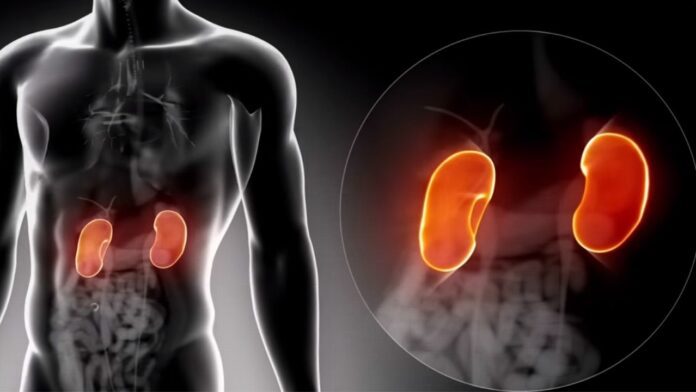Absolutely, it’s alarming habits that harm your kidneys and how many people overlook kidney health when considering overall well-being. According to the National Kidney Foundation, kidney disease claims more than 90,000 American lives every year.
That’s even more than the number of lives lost to breast or prostate cancer. The statistics are clear: we need to prioritize our kidney health if we want to live longer, healthier lives.
The good news? It’s never too late to start taking care of your kidneys. Many of us have daily habits that may not be kidney-friendly, but with some minor tweaks, we can make a big difference. Let’s break it down:
Use Herbs Instead of Salt
It’s startling how much salt many of us consume without even realizing it, and this can have a serious impact on our kidneys. Excessive salt intake disrupts the balance in our blood, forcing our kidneys to work overtime to remove excess water. According to a 2018 study published in the Journal of Clinical Hypertension, this could be a one-way ticket to kidney disease over time.
Think you’re safe because you don’t salt your food at the table? Well, you might want to think again. A lot of the sodium we consume comes from processed and pre-cooked foods—areas where we may not even suspect there’s a salt overload. And it adds up quickly!
The U.S. Department of Agriculture advises keeping our salt consumption to no more than a teaspoon a day, or roughly 2,300 mg. Believe it or not, that’s about a third less than what most Americans actually take in. So, the next time you’re reaching for a frozen dinner or a can of soup, check the label. Your kidneys will thank you.
Don’t Take Too Many Pain Relievers
The link between pain relievers like Advil and kidney issues is eye-opening! According to research published in the New England Journal of Medicine, about 5,000 cases of kidney failure in the U.S. every year can be traced back to heavy usage of such over-the-counter medications. But the question is: what counts as “heavy usage”?
Well, the study points out that taking painkillers on an empty stomach is particularly risky. So if you’re just popping an Advil now and then for a headache, and you’re taking it with food, you’re likely not putting your kidneys in immediate danger.
But there’s more. Dr. Grant Lipman, a medical professor at Stanford, provides additional insight into this. According to him, pain relievers can actually reduce blood flow to the kidneys. This might not seem like a big deal in the short term, but over time, it could put a serious strain on your kidneys. Surprisingly, he even notes that one in five marathon runners might be at risk for kidney damage, which is something most people wouldn’t even consider.
So, the takeaway? Be mindful when you reach for that bottle of pain relievers. Timing and moderation are key. If you’re going to use them, it’s better to do so with food, and only occasionally. Your kidneys work hard for you, so it’s only fair you treat them well in return.
Treat Yourself When You Get Sick
You know how it goes—you catch a couple of colds every year, and it’s tempting to just power through, especially when work is piling up. But before you become one of the 72% of Americans who show up to work sick, take a moment to consider what this could mean for your kidneys. According to the Centers for Disease Control and Prevention, the longer you’re under the weather, the more antibodies your body churns out. And over time, this could lead to inflammation in your kidneys.
Now, I’m not saying every sniffle is a cause for alarm. However, it’s those bacterial infections you really want to watch out for—think strep throat and ear infections. These baddies can put extra strain on your kidneys, so it’s crucial to address them right away.
So the next time you’re tempted to shrug off that pesky cold or ignore a sore throat, think twice. Take the time you need to get better. Your kidneys, not to mention your coworkers, will thank you.
Don’t Hold It In
You might be surprised to learn that something as simple as holding in your pee can be bad news for your kidneys. Dr. Cheamandeep Bali, from the Toronto Naturopathic Health Clinic, told the Huffington Post that not heeding nature’s call can lead to a host of health issues. How so? Well, the longer urine stays in your system, the more bacteria it generates. And when that bacteria makes its way to your kidneys, you’re asking for trouble.
Urologist Mark Gordon weighs in with some straightforward advice: most people should be hitting the restroom about eight to 10 times a day. We all know that sometimes you just have to hold it in—whether you’re in a meeting or stuck in traffic. But making a habit of it? Not a good idea.
So, if you’ve gotta go, just go. Your kidneys will be all the happier for it.
The Danger of Processed Foods
We all know that processed foods are convenient, but it turns out they’re not doing our kidneys any favors. You probably know they’re packed with sodium, which is already a red flag for kidney health. But according to NEPHCURE Kidney International, sodium isn’t the only thing in processed foods that could give your kidneys a hard time. Say hello to potassium and phosphorus, the other hidden culprits.
Normally, our kidneys are pros at filtering out things like potassium, but too much of it can make them work overtime. The same goes for phosphorus. If your kidneys aren’t in the best shape, you’ll really need to watch how much potassium and phosphorus you’re taking in.
The bottom line? If you limit your intake of processed foods, you’re already taking a big step in the right direction for kidney health. Your kidneys do a lot for you; it’s only fair to make their job a little easier when you can.
Steer Clear of Soda
Soda—the sweet, fizzy drink many of us find hard to resist. But before you crack open another can, let’s talk about what that sugary beverage is doing to your kidneys. Believe it or not, a single 12-ounce can of soda packs as much sugar as three and a half donuts. If that’s not startling enough, research shows that downing just two or more sodas daily can actually double your risk of kidney disease. Yikes!
And sugar’s not the only bad guy in the soda can. A 2007 study found that cola, in particular, is a kidney no-no because of its phosphoric acid content. This acid can mess with your genes in a way that, over time, could spell trouble for your kidneys.
So, what’s the verdict? If you want to do your kidneys a favor, consider cutting back on the soda. Limiting yourself to just one can a day can make a big difference, and if you can reduce that to a once-a-week treat, even better. Your kidneys—and probably the rest of your body—will thank you for it.
Stick To Your Prescription
Listen, when it comes to medication, consistency is key—especially for something as crucial as kidney health. You might be tempted to skip a dose when you’re feeling good, but that’s a game you don’t want to play. Medicines like those for blood pressure and pain relief can actually stress out your kidneys if you’re not consistent in taking them. In some cases, abruptly stopping can even lead to what’s known as a “rebound” effect, where you might find yourself dealing with something as serious as a second heart attack or even kidney failure. Trust me, it’s not worth the risk.
Our kidneys love routine. If you’re constantly messing around with your medication schedule, you’re not just confusing your kidneys—you’re throwing your whole body out of whack. So, if you have any doubts or concerns about your meds, especially antibiotics that can be particularly harsh on the kidneys, have a chat with your doctor. The goal is to be on the same page about how to best manage your health, kidneys included.
Research Your Supplements Before You Take Them
So you’re a fan of daily supplements and vitamins? That’s cool, but hold on a minute. While you might think you’re doing your body a favor, some of these can actually be tough on your kidneys. A review by the American Society of Nephrology back in 2012 highlighted a few key offenders: we’re talking about cranberry, willow bark, wormwood oil, licorice, geranium, and even good ol’ vitamin C.
What’s the deal? Well, high doses of vitamin C and cranberry, for instance, can increase your chances of developing kidney stones. Not fun, right? Plus, if you’re already dealing with health issues like diabetes or an autoimmune disorder, you’ll want to have a word with your doctor before diving into the supplement aisle. Even natural go-tos like turmeric can be problematic if you’re taking certain medications.
The takeaway? Supplements aren’t always as innocent as they seem. If you’re going to use them, make sure you’re in the clear health-wise, especially where your kidneys are concerned.
You’re Exercising, Right?
Hey, if you’re serious about keeping your kidneys in top shape, you might want to lace up those sneakers. Regular exercise isn’t just for those looking to drop a few pounds; it’s a game-changer for anyone keen on keeping their kidneys healthy. According to the National Kidney Foundation, exercise does wonders like lowering your blood pressure, improving your sleep, and boosting your muscle function. Basically, it knocks out a bunch of major risk factors for kidney disease all in one go.
The best part? You don’t have to go all out to make a difference. A 2019 study showed that people with kidney issues saw benefits from just 150 minutes of moderate exercise a week. We’re talking about just over 20 minutes a day of activities like walking, gardening, dancing, or biking. Plus, let’s not forget the feel-good endorphins that come along for the ride, making you happier overall.
Don’t Go Too Hard At The Gym
While exercise is generally great for your health, there’s a cautionary tale here: you can actually push yourself too far. Ever heard of Rhabdomyolysis, or “Rhabdo” for short? It’s a pretty serious condition where your muscles break down and release enzymes that can be toxic to your kidneys. In some cases—about 40% to be exact—it can even lead to kidney failure.
Now, don’t panic. Rhabdomyolysis is pretty rare, but it’s something to be aware of. Dr. Maureen Brogan from New York Medical College points out that you’re most at risk during, believe it or not, your first class of a new exercise regimen. Say you decide to go full throttle in your first-ever cycling class; that’s when you’re more likely to get into trouble. The takeaway here is that muscles need time to adjust, so ease into new exercises.
The moral of the story? By all means, get moving, but pace yourself and give your muscles—and your kidneys—the time they need to adapt.
Beware Energy Drinks
You might want to think twice before chugging that next energy drink. There’s a growing call for the FDA to step in and regulate these beverages, and for good reason. A study published in Frontiers in Public Health has flagged energy drinks as a possible culprit in kidney disease, particularly among kids. I know, it sounds concerning, right?
It’s not just the caffeine buzz that you need to worry about. Sure, too much caffeine can spike your blood pressure and stress levels, putting a strain on your kidneys. But there’s also another ingredient lurking in the can: taurine. This amino acid, commonly found in energy drinks and some sports supplements, can be pretty hard on your kidneys—especially if you already have a chronic kidney disorder.
So, what’s the game plan? While more research is needed to draw definitive conclusions, it’s probably a good idea to play it safe. Maybe limit your energy drinks or consider cutting them out altogether, at least until we know more. Your kidneys will likely thank you for it.
Are You Drinking Enough Water?
You know that water bottle you keep on your desk or carry around? It’s not just a convenient sipper; it’s actually a tool to help keep your kidneys in tip-top shape. One of the kidneys’ main gigs is to filter water, so you’ve gotta keep the system well-lubricated. The National Hydration Council has found that a lot of kidney stones actually come from chronic dehydration. When you’re not drinking enough, your urine gets super concentrated with minerals. And guess what? Those minerals can turn into little crystals that eventually grow into painful kidney stones. Ouch!
So, how much water should you be drinking? Well, there’s no one-size-fits-all answer. The National Kidney Foundation doesn’t give a strict guideline, but the Institute of Medicine suggests about nine cups a day for women and 13 for men. Even that’s pretty flexible, though. The key is to listen to your body and drink when you’re thirsty.
So, go ahead and make hydration a habit. Your kidneys will definitely appreciate the love.
A Lot of Red Meat Could Be Toxic
Love a good steak or burger? While indulging in red meat every so often isn’t a crime, you might want to consider the impact on your kidneys if you’re eating it all the time. According to the Journal of the American Society of Nephrology, red meat might actually be “possibly kidney toxic.” The science isn’t super clear-cut on why that is, but one theory is that red meat could generate too much dietary acid.
Now for some good news: If you’re open to mixing things up a bit, plant-based proteins might be a kidney-friendly alternative. The research even suggests that swapping out just one serving of red meat a week could reduce your risk of kidney disease by an impressive 62%. That’s right—just one less steak dinner could make a real difference in the long run.
So, if you’re looking for a simple change that can really benefit your kidney health, maybe try going plant-based for a meal or two each week. Your kidneys will thank you!
Standing more often is good when possible
If your job has you glued to a chair all day, listen up: all that sitting could be tough on your kidneys. A study published in PLoS One in 2018 found that those who are more active have a significantly lower risk of kidney failure. Just an extra hour of physical activity each day could make a big difference.
Why is sitting so bad for your kidneys? Well, researchers are still puzzling over that one, but Dr. Thomas Yates from the University of Lancaster thinks it might have to do with the benefits of exercise on blood sugar and cholesterol levels. Both high blood sugar and high blood pressure are known baddies when it comes to kidney health.
So what can you do? Consider standing more often. Maybe get a standing desk or make it a point to get up and move around regularly throughout the day. It’s a small change, but your kidneys will likely be grateful for the extra love and attention.
Don’t Light Up
We’ve all heard the health warnings about smoking and its impact on our lungs and heart, but did you know that it’s not doing your kidneys any favors either? A study published back in 2000 in the Annals of Internal Medicine revealed that chronic smokers, both current and former, are more likely to end up with kidney issues. Apparently, substance abuse leads to a build-up of creatinine, a chemical waste molecule that’s no friend to your kidneys.
Here’s the kicker: this kidney damage is often a silent problem. That’s right—you could be wreaking havoc on your kidneys and not even know it. But hey, there’s a silver lining. The study found that folks who had kicked the habit had less kidney damage compared to those who were still lighting up. So, if you needed one more reason to quit, consider this a pretty compelling one. Your kidneys will thank you for it.
Skip The Butter
So, you’ve heard that butter is back in style and margarine is out, right? But before you make that swap in the name of health trends, think about your kidneys. According to the National Kidney Foundation, butter’s saturated fats can be a real downer for kidney health. Why? Because they can bump up your levels of LDL cholesterol—that’s the “bad” kind.
But hey, no need to go cold turkey on butter. It’s fine to enjoy it occasionally, just don’t slather it on everything you eat. If you’re leaning towards margarine, just make sure you’re choosing one without trans fats or “hydrogenated” fats on the ingredient list. These trans fats are actually even worse than saturated fats when it comes to raising your LDL levels.
So, whether it’s butter or margarine, moderation is key. Your kidneys will definitely appreciate the thoughtfulness!
Avoid Overeating Even During Holidays
Ah, the holidays—the time of year when overindulging in food is almost a tradition. But before you go for that second helping of mashed potatoes and gravy, think about what it means for your kidneys. Dr. Sreedhar Mandayam from Baylor College warns that overeating can put a lot of stress on these essential organs. Essentially, the more you eat, the harder your kidneys have to work to process it all.
And guess what? Those festive feasts full of protein, carbs, and fats are pretty much a triple threat for your kidneys. Yeah, I’m looking at you, Thanksgiving and Christmas dinners. But don’t worry, you don’t have to skip the festivities. Just try not to make overeating a regular thing. Be mindful of your portions and eat only when you’re genuinely hungry, not just because you’re bored or tired.
So go ahead, enjoy the holidays, but maybe go a little easy on the stuffing this year. Your kidneys will thank you.
Work to Lower Stress
Feeling stressed out? You might want to take a breather—not just for your peace of mind, but also for the sake of your kidneys. Yep, you heard that right. Chronic stress has long been a suspect in messing with kidney health, though researchers are still piecing together the puzzle of how exactly it all works. Some scientists have theorized in publications like Advances in Chronic Kidney Disease that stress might bump up your blood pressure, leading to long-term damage to your kidneys.
And let’s be real, when stress levels go up, we often don’t do the best job of taking care of ourselves. We might let our diet slide or skimp on sleep, both of which aren’t exactly great for kidney health either. If you find yourself caught in a loop of ongoing stress, it might be worth seeking some professional help. Chatting with a mental health expert might not only ease your mind but could also keep other aspects of your health, like your kidneys, in better shape.
So next time you’re stressed, remember that a chill pill (figuratively speaking, of course) might just be what the doctor ordered for your overall well-being.
Substitute Sugar
Sure, a little sugar here and there won’t make your kidneys raise the white flag. But things start to get tricky when you’re constantly bombarding your system with sugary treats. Why? Well, the American Diabetes Association points out that sky-high blood sugar levels can really make your kidneys work overtime. And just like anything that’s overworked, your kidneys can start to wear out, setting the stage for potential kidney diseases down the line.
Researchers at the University of Montreal have even discovered a two-way street between diabetes and kidney disease. Basically, diabetes can lead to kidney problems, but guess what? Kidney issues can also give you a one-way ticket to diabetes. It’s like a vicious cycle that nobody wants to be a part of.
So, the moral of the story? Keep an eye on your sugar levels. Get your blood glucose tested regularly to keep both diabetes and kidney problems at bay. Trust me, a little less sugar now could save you a lot of trouble later.
Staying up late strains your kidneys
You know how you feel groggy and out of sorts when you don’t get enough sleep? Well, turns out your kidneys aren’t too happy about it either. A 2016 study from the University of Chicago found that people who averaged only 6.5 hours of sleep per night were 19% more likely to experience kidney failure. Yep, you read that right.
Here’s the deal: Your sleep cycle actually cues your kidneys on when it’s time to kick back and when it’s time to get to work. The folks at the National Kidney Foundation say that when you burn the midnight oil, your kidneys are right there with you, working away when they should be resting. Over time, skimping on sleep can really wear these guys out.
So, how much sleep should you aim for? Experts recommend clocking in between seven and nine hours each night. Trust me, your kidneys will thank you.
Artificial Sweeteners Are Not Generally Better
Thinking about cutting calories with some Splenda or a diet soda? Well, you might want to think again. A 2009 study found that drinking diet soda could up your risk of kidney disease by a whopping 30%. Yeah, it’s a bit of a buzzkill.
But hey, it’s not all doom and gloom. The study suggests that having less than two artificially-sweetened drinks a day probably won’t do much harm to your kidneys. Still, if you’re a fan of erring on the side of caution (like me), you might want to consider some natural alternatives. How about sweetening your iced tea with a little honey or Stevia instead?
So, until we have more definitive research, it’s probably best to play it safe when it comes to artificial sweeteners.
Drink Only in Moderation
Love a cold one after work? Or maybe a glass of wine with dinner? Sure, drinking can be a way to unwind, but you’ve got to know when to say when—especially for the sake of your kidneys. According to the National Kidney Foundation, knocking back more than four drinks a day can really put the pressure on these essential organs.
But hold on, it’s not all bad news for you social drinkers out there. A study from 2005 actually found that moderate drinking could be kind of a good thing for your kidneys. The folks in the study who had one or two drinks a day, adding up to at least seven drinks a week, saw their risk of kidney problems drop by about 30%.
So, the takeaway? If you enjoy drinking, it’s all about moderation. A glass here and there could even be beneficial, but overdoing it is a one-way ticket to kidney stress city. Cheers to balanced choices!
Avoid Taking Medicines for Bodybuilding
Looking to bulk up fast? You might be tempted to reach for some performance-enhancing steroids, but before you do, let’s talk about what that can mean for your kidneys. According to a 2009 study, a staggering nine out of ten bodybuilders using these types of meds ended up with scarred kidneys. Yikes, right?
The good news? When these athletes kicked the steroid habit, their kidneys started to bounce back. But why even go there in the first place? The American Society of Nephrology strongly advises against using steroids. Not only do they mess with your kidneys, but they can also spike your cholesterol, reduce protein levels in your blood, and cause swelling.
Sure, there are legit medical reasons for taking steroids, including some kidney treatments. But using them just to look a bit more buff? That’s a hard pass. Keep it natural and take care of those kidneys!
Heartburn Drugs can Cause Long-term Damage
Dealing with heartburn? You might be popping proton pump inhibitors (PPIs) to keep that acid in check. But hold on a second. Research from Kidney International says that taking PPIs regularly might not be such a hot idea for your kidneys. Believe it or not, doing so could bump your chances of getting chronic kidney disease by a worrying 26%.
Don’t stress too much, though. H2 Blockers, another type of heartburn med, haven’t been shown to have the same nasty effect on your kidneys. So if heartburn is a daily struggle for you, maybe have a chat with your doc about making the switch. If you’re just taking PPIs now and then, you’re probably in the clear. But as always, better safe than sorry!
Regularly check blood pressure
You know how they say high blood pressure is the “silent killer”? Well, there’s a good reason for that. The sneaky thing doesn’t give you symptoms, so you might not even know you’ve got it. That’s why the American Heart Association is like, “Hey, get that blood pressure checked every couple of years, okay?”
Skipping that quick check-up? Bad idea, especially for your kidneys. High blood pressure can actually mess up the blood vessels in your kidneys, making it tough for them to do their job. And guess what? When your kidneys can’t keep your blood pressure in check, it can skyrocket pretty darn fast. So don’t snooze on your doc’s advice to get checked out. It’s a small thing that could save you from big problems down the line.
Do You Really Require Another Coffee?
Are you a coffee addict who can’t start the day without a cup—or three? You might want to pump the brakes a bit. The National Kidney Foundation says it’s not that coffee’s necessarily bad for your kidneys, but chugging too much can be sketchy. See, caffeine can make your blood pressure do a little dance and spike up suddenly. The jury’s still out on how this affects your kidneys long-term, but why risk it?
Dr. Jessica Saville, who’s in the know at the National Kidney Foundation, suggests sticking to under four cups a day. Oh, and about those fancy lattes with all the cream and syrup? They might taste heavenly, but they’re loading you up on extra sugar and fats, which isn’t doing your kidneys any favors. So maybe consider cutting back a bit, for the sake of those hardworking kidneys.
Eat Less Shellfish
Are you a seafood aficionado, especially when it comes to shellfish? You might want to think twice before indulging too much. Researchers in a 2014 study published in the Journal of the American Society of Nephrology have found that shellfish contain a toxic chemical called domoic acid. It’s also known as “Amnesic Shellfish Poisoning,” and guess what? It’s not too friendly to your kidneys.
What’s wild is that even small amounts of this stuff can be bad news for your kidneys. For perspective, your brain can handle about 100 times more domoic acid than your kidneys can. So, if you find yourself loading up on oysters and clams often, you might want to scale back. According to this research, you’re putting yourself at a higher risk for kidney issues.
How MRIs, CT Scans And X-Rays May Hurt You?
You know how sometimes you have to get an MRI for various medical reasons? Well, the MRI itself isn’t the issue when it comes to your kidneys. It’s actually the contrast dye that could potentially give you a headache—or more accurately, a kidney ache. The situation’s so serious that there’s even a name for it: Contrast Induced Nephropathy (CIN).
So, what does CIN do? According to the National Kidney Foundation, it can basically put your kidneys on a temporary hiatus for about two to three days. Yikes, right? But don’t panic just yet; the good news is CIN is usually reversible. Plus, it’s only certain types of contrast dyes that up your risk. If you’re scheduled for an MRI and are concerned about this, don’t hesitate to have a chat with your healthcare provider. They can give you the lowdown on how to navigate this.
Eat Specific Fats
You’ve probably heard the mantra: “Not all fats are bad.” And it’s true! Your body actually needs good fats like monounsaturated and polyunsaturated ones. But there’s a villain in the fat world that you should definitely steer clear of: trans fats. These are often hiding in foods like ready-made dough and certain creamers.
So, why are trans fats the bad guys? Well, according to a study in the British Medical Journal from 2015, while saturated fats don’t seem to harm your heart, trans fats can increase your risk of heart disease by a staggering 21%. And the American Heart Association backs this up, saying that trans fats are guilty of boosting your “bad” LDL cholesterol levels.
What should you do? Keep an eye out for hydrogenated oils on ingredient lists. The FDA doesn’t even consider these oils safe. So, next time you’re grocery shopping, make it a point to look for foods that proudly declare they have 0% trans fat. Your heart will thank you.
Another Reason to Sleep More
Ever wonder if hitting the snooze button a couple of times is good for you? Well, according to a long-term study published in 2014 in the European Journal of Preventive Cardiology, getting enough sleep is actually really good for your heart. The magic number? At least seven hours a night to keep your ticker in top shape.
The National Sleep Foundation backs this up, saying that when you’re in deep sleep, your body releases chemicals that help chill out your heart rate and blood pressure. But what if you’re tossing and turning all night, or have something like sleep apnea? Turns out, that can spike your risk of heart disease by a whopping 58%.
So, if you’re finding it hard to get a solid seven hours, it might be time to have a chat with your doctor. Trust me, your heart will thank you for it.
Check Your Stress for Your Heart
Ever notice how your body reacts when you’re super stressed? You breathe faster, your muscles get tense, and your heart starts to race. Believe it or not, this constant state of high-alert isn’t just a fleeting moment of discomfort—it can actually take a toll on your heart over time. This is true even if you’ve never had any heart issues before.
Dr. Deepak Bhatt, who runs the Integrated Interventional Cardiovascular Program at Brigham and Women’s Hospital, makes it clear that we’re not talking about just a momentary panic attack here. When they’ve looked inside the hearts of people under chronic stress, they’ve found that arteries that were once open are now closed up.
So, what’s the fix? It could be as simple as taking ten to fifteen minutes a day to chill out. Whether it’s through meditation, soaking in a bath, or even leveling up in a video game, finding a way to dial down the stress is good for your heart. So go ahead, take that break—you’ll be doing your ticker a favor.
More fruits and veggies please
Wondering which fruits and veggies are best for your heart? The answer’s a no-brainer: pretty much all of them. A 2017 mega-study that analyzed 95 separate studies came to a pretty encouraging conclusion. The research, published in the International Journal of Epidemiology, found that just eating five servings (that’s roughly 2.5 cups) of fruits and veggies a day can give your heart health a little boost. Want to go the extra mile? Double that intake to ten servings a day, and you’re looking at cutting your risk of heart disease by 28% and even reducing your odds of kicking the bucket early by 31%.
So, which fruits and veggies came out on top in this study? The champions were apples, all kinds of citrus fruits, pears, and an assortment of green leafy and yellow-orange veggies. But honestly, you can’t go wrong with any fruit or vegetable. So go ahead, pile ’em on your plate!
Don’t Watch TV All Day
You might want to think twice before binge-watching that new series, especially if you care about your heart health. A 2015 study that tracked nearly 70,000 women over two decades found that some simple lifestyle changes could massively reduce the risk of heart attacks — by up to 92%, to be exact. And one of those game-changing habits? Limiting TV time to less than seven hours a week.
Why does this matter? Well, it’s pretty straightforward. The more time you spend glued to the screen, the less time you’re up and moving. A separate study from 2019 published in the Journal of the American Heart Association hammered this home. It found that exercise doesn’t really counteract the heart-harming effects of too much TV time. In fact, sitting for four hours a day watching TV could be even worse for your heart than a sedentary desk job.
So maybe consider swapping some of that screen time for a brisk walk or a jog. Your heart will thank you.
You Live Longer With 15 Minutes Of Exercise
Wondering how much exercise you really need to keep your heart in good shape? You might be surprised to learn that it doesn’t take as much as you’d think. A 2016 study from The American Journal of Medicine crunched the numbers and found that just 15 minutes of exercise a day can add three years to your life compared to those who don’t exercise at all.
According to Dr. Harvey Simon, the study’s author and an associate professor at Massachusetts General Hospital, you don’t have to run marathons to see big health benefits. “If you’re working out for the sake of your health, it really doesn’t take much to see a huge impact,” he said. Even something as simple as a 15-minute daily walk or some light gardening can significantly lower your risk of heart attack and stroke.
So there you have it—no more excuses! Just a quarter of an hour a day can make a world of difference for your heart.
Friends Can Truly Save Your Heart
Need another reason to keep up with your friends and maintain meaningful relationships? Believe it or not, who you hang out with can affect your heart health. A 2017 study by the American Heart Association found that people with more social ties tend to have less heart disease. And this isn’t just a one-off finding; a ten-year review study in Frontiers in Psychology backed it up.
So how does being social benefit your heart? Researchers from Boston Scientific think it might have to do with lowering stress and depression, two big contributors to heart problems. If you’re looking for ways to be more social, consider joining a support group, adopting a furry friend, or volunteering. Your heart will thank you!
Drink Water–At Least Five Glasses A Day
Feeling thirsty? Your heart might be, too. According to a study from way back in 2002 in the American Journal of Epidemiology, staying hydrated is key to keeping your heart in good shape. Aim for about five glasses of water a day to keep your ticker happy. On the flip side, if you’re only sipping two or fewer glasses daily, you could be stressing out your heart and setting the stage for cardiovascular issues down the line.
And here’s a bit of science to back it up: research in the British Journal of Haematology showed that the thickness of your blood—known as blood viscosity—actually has a direct impact on your heart health. When your blood’s too thick, your heart has to work extra hard, which could wear it out over time. Drinking enough water helps thin your blood, making life a whole lot easier for your heart. So go ahead, have another glass of H2O!
Stand Up!
Stuck at a desk job? Well, it’s not just your back that might be suffering; your heart could be feeling the strain, too. A pretty comprehensive look at 41 studies back in 2015 warned us that sitting around all day can actually bump up your risk for some heavy hitters like cardiovascular disease, type 2 diabetes, and even cancer. Fast forward to 2019, and another study drove the point home: cutting out just one hour of sitting time each day can actually slash your chances of developing heart disease by a whopping 26%.
So, what’s the game plan? Try not to sit in one place for too long. If you’re lucky enough to have a standing desk, make good use of it. If not, no worries—just make it a point to stand up and stroll around a bit throughout the day. Heck, even parking your car a bit farther from the office could help. Consistency is key here; making little changes like these can really add up for better heart health. So go ahead, stand up for your heart—literally!
Frequent Blood Pressure Checks
High blood pressure isn’t something to take lightly. In fact, a study in The Lancet pointed out that it was the top cause of heart disease back in 2010. What’s the big deal? Well, high blood pressure can lead to hypertensive heart disease, which means your heart gets thicker and your arteries get narrower. That’s why the American Heart Association is saying avoiding high blood pressure should be on everyone’s health to-do list.
Now, if you’re currently in the clear and don’t have high blood pressure, don’t think you’re off the hook. Prevention is key. Whether it’s once a month or even just once a year, make sure you get your blood pressure checked. A 2015 study in The New England Journal of Medicine even said that keeping your blood pressure under 120 mm Hg could significantly lower your risk of heart disease. So, why not make it a habit to keep an eye on those numbers?
Don’t Take It For Granted
If it’s been a few years since you last got your blood pressure, cholesterol, or blood sugar levels checked, it’s high time you make that appointment. The American Heart Association suggests a yearly blood pressure check, mainly because high blood pressure often doesn’t show any symptoms. As for your blood sugar and cholesterol? You should be getting those looked at every three and four to six years, respectively.
Dr. Robert Ostfeld, who heads up preventive cardiology at Montefiore Health System, has a simple message: “Don’t assume you’re not at risk.” If any of these levels turn out to be outside the normal range, you’ll probably need to go in for check-ups more frequently, and medication might even be on the table. So, better to know sooner rather than later, right?
Know Your Ideal BMI
Weight can be a sensitive topic for a lot of people, often because it’s tied to self-image. However, from a medical standpoint, your weight is really about your overall heart health, not how you look in a mirror. A study published in JAMA Cardiology in 2018 found that a high body mass index, or BMI, significantly increases your risk of heart disease.
So, where to start? First things first, figure out your BMI. Sure, you can use online calculators, but it’s better to consult with a doctor for the most accurate and personalized information. As Dr. Chanté Wiegand, a Naturopathic Doctor and Director of Education at The Synergy Company, puts it: “There’s no one-size-fits-all approach.” Knowing your ideal weight range can be the first step towards a heart-healthy life.
Brush Your Teeth Daily for Your Heart
You might find it surprising, but taking care of your gums could be a step toward taking care of your heart. Harvard Health points out that the bacteria lurking in your gums could make their way to your blood vessels. Once there, they can cause inflammation and even tiny blood clots, raising your risk for a stroke. Numerous studies back up this connection between oral health and heart health.
That said, the jury is still out on just how strong this link is. In 2012, experts from the American Heart Association reviewed multiple studies and concluded that gum disease doesn’t necessarily spell doom for your heart. Still, it doesn’t hurt to be cautious. A good rule of thumb? Brush and floss every day. It’s a small effort that could make a big difference.














![Technical Aspects of 844 Area Code in 2024 [Detail Guide] 844 Area Code](https://articleify.com/wp-content/uploads/2024/01/844-Area-Code-150x150.jpg)














